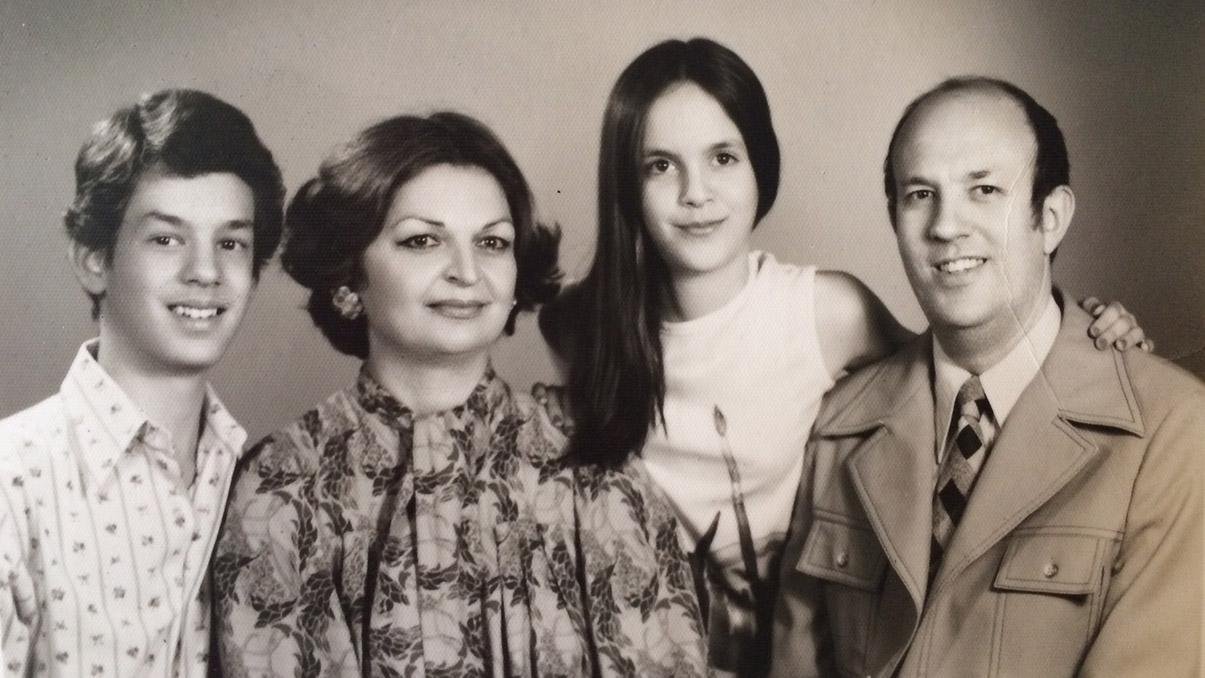The Copeland family portrait which was taken a couple of weeks before Max Copeland was arrested and put on trial in Iran.
"I have the blood of the Great Satan and the Axis of Evil in my veins."
That's how Iranian American Cyrus Copeland describes his background in a new book (excerpt below). He has an American father and an Iranian mother.
His father, Max Copeland, and his mother, Shahin Maleki, met while they were students in Washington DC. They got married and started a family. They then moved to Iran.
"We had an incredibly idyllic life," Cyrus recalls about their life in Iran. "We had a house at the foot of the mountains…and for several years, I just lived a really lovely life."
Shahin was a principal at a local school and Max worked for Westinghouse, which sold defense equipment to the Iranian air force. Copeland's idyll was shattered in the 1979 Islamic Revolution. As chaos enveloped the country, thousands of foreigners rushed to leave. Companies pulled out their assets and equipment. Westinghouse was no exception. Higher-ups in the US decided it was time to close shop in Iran.
Westinghouse gave Max Copeland the task of overseeing the packing and shipping of all Westinghouse equipment and property. “He was, in essence, a “Clean-Up Man,” sort of like George Clooney in Michael Clayton," says Cyrus.
Among the equipment Max had to ship was a container full of radar equipment. It was stopped at Tehran's Mehrabad airport and Max was promptly arrested and charged with espionage.
"One night he [Max] didn't come home and we had no idea what had happened to him," Cyrus recalls.
It was only later that Shahin discovered Max had been arrested and taken away. She pleaded to the US government for help but didn't hear back.
Washington was busy — a group of young Iranian revolutionaries had taken the staff of the US embassy in Tehran hostage. To add to the tension, no lawyer in Iran would take on Max's case. Anti-American sentiment was high. Who would want to represent an American accused of being a spy?
Shahin took matters into her own hands. She decided she would represent Max in court. "My mother was a Royalist in Revolutionary Iran, representing an alleged American spy," recalls Cyrus, who was a teenager then.
As difficult as those days were for the Copeland family, they managed to make it through. But for more than three decades, Cyrus Copeland carried around a question in his head.
"I wanted to know, 'Was my father a CIA agent?'" he says. "Was the charge against him true?"
He didn't have much to go on with. His father had died years ago and the CIA wasn't particularly helpful. "This is the response that they gave to me after filing [a] FOIA request," he says in an interview in New York, showing me a letter. "Essentially it says the CIA can neither confirm nor deny the existence or non-existence of records responsive in our request for information about my dad."
He sought out the help of David Smallman, a prominent lawyer who had worked on a couple of high-profile cases before. Smallman says that if Max was in fact a CIA operative, it would be highly unlikely that the CIA would release details about his case. To them, it doesn't matter that decades have passed.
The thinking is, according to him, that there is a chance that releasing information would jeopardize ongoing operations. In the end, Cyrus Copeland was able to find answers. He wrote about it in "Off the Radar; A Father's Secret, a Mother's Heroism, and a Son's Quest."
But he says through researching and writing the book, he managed to find something much deeper. "It ended up being a tool for my realizing something larger and getting to know my father in a way which quite frankly I didn't…when he was alive."
Cyrus chokes up as he says these words.
Excerpt: "Off the Radar: A Father's Secret, a Mother's Heroism, and a Son's Quest"
